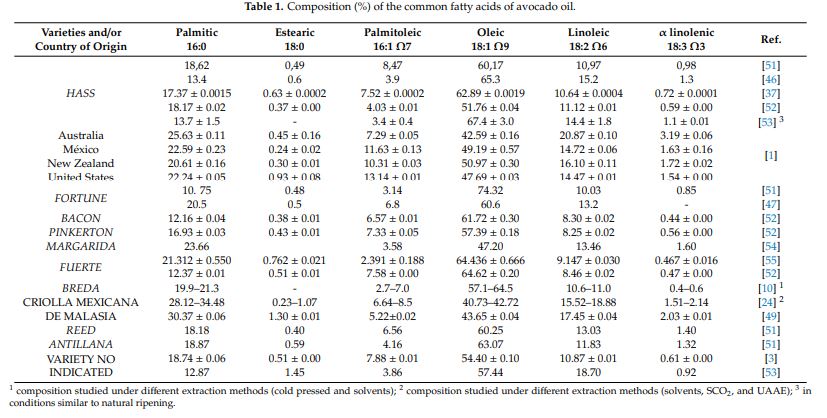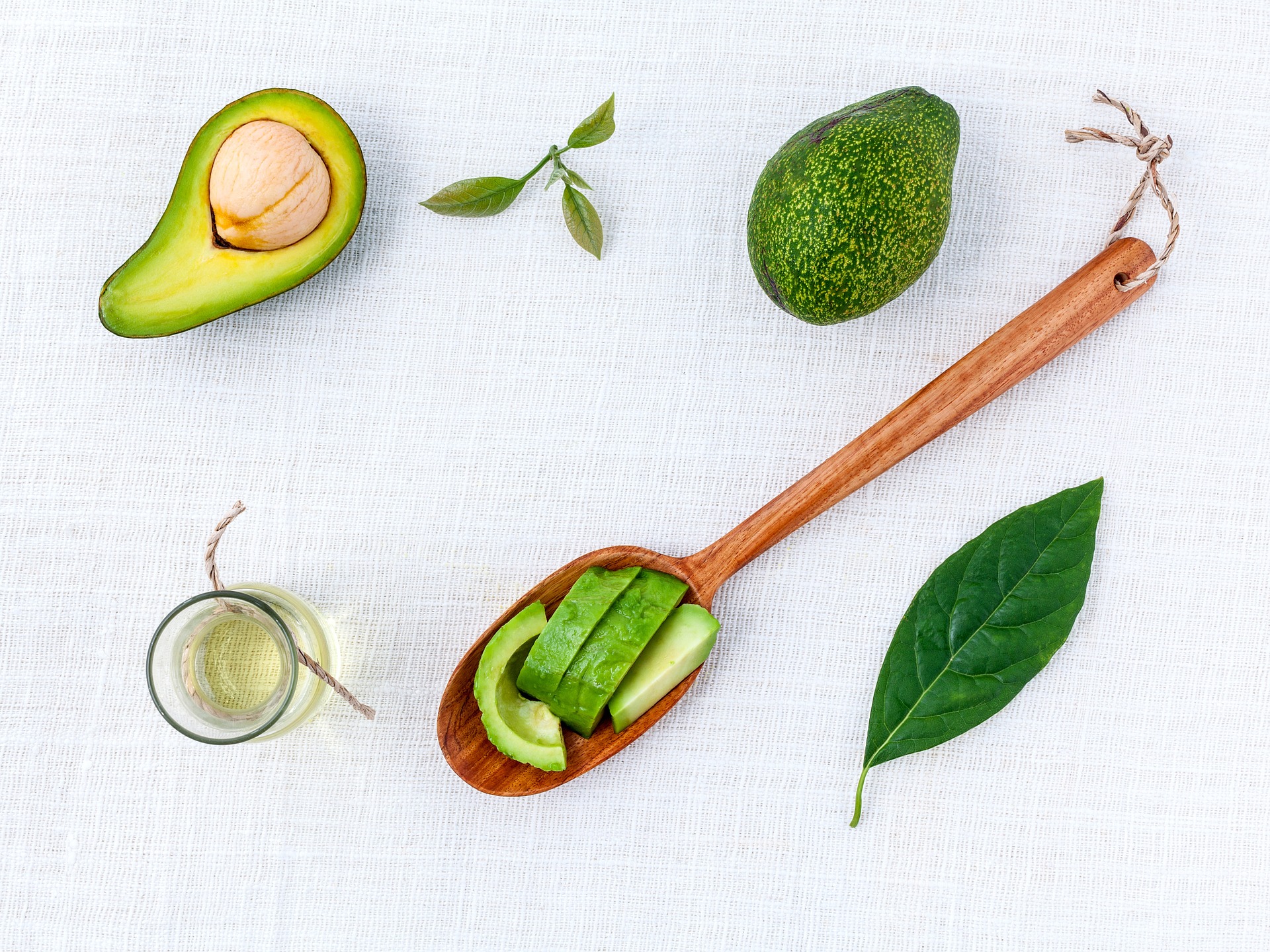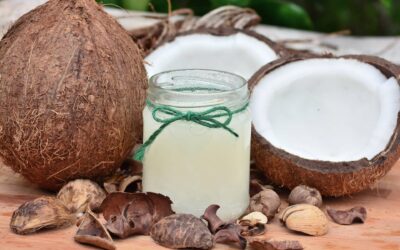Avocado which is widely considered an energetic fruit is packed with high nutritional values. The avocado is known to be a very important tropical fruit rich in healthy fats, protein, and vitamins A, B, D, and E.
The Avocado fruit is gaining popularity and acceptance due to its health benefits, and most importantly due to the observed characteristics of the compounds available in the lipid fraction which are known to be phytosterols, tocopherols, squalene, and omega fatty acids (1).
What is also important about the avocado fruit is it contains different oil levels in the pulp which is pulling the attention of the pharmaceutical and cosmetic industry. Also, the oils present in the avocado fruit are very similar to Olive oil with closer attention to the fatty acid composition.
The avocado crop
The tree of the avocado fruit is originally from Mexico known as the largest grower and cultivator of avocado. The tree belongs to the Lauraceae family of plants, genus Perseal which is also represented in two subcategories; Pesea and Eriodaphne.
The genus Persea is also divided into three botanical varieties namely; Persea Americana Miller var. Drymifolia (Mexican Species), Persea Americana Miller var. American (West Indian Species), and the Persea nubigena Miller var. Guatemalenis (Guatemalan species).
The climatic conditions that favor the growth of the avocado tree are related to the temperature and rainfall and the varieties or species are known to behave differently according to their race. The avocado tree is a perennial plant and can grow easily on rough locations. The tree has a very high fruit yield, which may reach a production of 138kg at 7 years after planting.
Worthy of note is the most exported variety or specie worldwide, which is the Hass. The fruit has an average size of 180 to 300g.
Avocado Oil
Avocado oil is obtained from the pulp of the Avocado fruit which contains high lipids content and crowns the pulp as the portion of highest interest. The pulp of the avocado fruit is known to contain about 60% oil, 7% skin, and 2% for the seed (2).
For the Lipids, they vary between 5 to 35%, and made up of mostly unsaturated fatty acids (60-84%) (3). The avocado species with less core and shell percentages turn to be the best for oil extraction due to higher pulp yield.
However, the number one challenge of producing avocado oil is the high moisture content in the fresh pulp. It affects the extraction process, the yield, and the cost of production.
If we have to consider the varieties or species suitable for oil extraction, considering the minimum of 18% lipids and low moisture levels, the Hass, Fuerte, and Gloria makes all the difference, and also the Collinson, Anaheim, Itzamma, Wagner, Ouro, Verde, Carlsbad, and Mayapan species cannot be neglected.
The main producers of avocado oil in the world are Mexico, New Zealand, the United States, South Africa, and Chile. The growing interest in avocado oil is seen in its high human nutritional values, and its endless possibilities in the food, pharmaceutical, and cosmetic industry.
The lipid is consists of mainly monounsaturated fatty acids which are associated with anti-inflammatory effects and good for the cardiovascular system.
Types of Avocado Oil.
There are actually no international labels of defined parameters for avocado oil. Since the compounds found in the avocado oil are quite similar to the olive oil, the values used are those recommended for olive oil.
A proposed classification for avocado oil was based firmly on its extraction method and the quality of the actual fruit. It is worthy to note that the quality of the oil is highly determined by the production process and method used to obtain the oil.
Avocado oil referred to as “extra virgin” is of a higher quality and corresponds to the oil produced from a higher quality fruit, organically cultivated and extracted only through mechanical methods and under the lowest possible temperature level. The use of chemical solvent in this process is a hundred percent absent. Such production process is widely termed as “cold pressing” method.
With “Virgin” avocado oil, the fruit used is of slightly lower quality (with small areas of rot and physical alterations), extracted through a mechanical process with a temperature level below 50 ◦C, and without the use of chemical solvents.
And with “pure” avocado oil, the quality of the fruit is not of any prime importance. The oil obtained is bleached and deodorized oil infused with natural flavors of herbs and or fruits. Many refer to the oil as “refined avocado oil” and it is produced under high level of heat and above 50 ◦C and higher.
And finally, there is the “mixed” avocado oil which is a combination of olive, macadamia, and other vegetable oils. This makes the oil present variable sensory and chemical characteristics.
However, there is the existence of the “crude avocado oil” which is characterized by a slightly amber-colored fatty liquid obtained through physical extraction of the pulp and the seed of the avocado fruit.
Production Methods of Avocado Oil
As mentioned earlier, the ways vegetable oils are obtained greatly affect the characteristics and quality of the oils. Certain production methods help to retain the natural characteristics of the oil and preserve the nutrients and bioactive compounds which is all that makes some oil interesting and appealing to use.
However, avocado oil has been considered as a vegetable oil that is consists of major and minor components that are greatly appreciated by society, even at low or high production temperatures, and for its multiple technological applications.
The Cold Pressed Production Method
The cold-pressed production process is a method we mostly work with and highly recommend. With the cold-pressed production, the method applies a mechanical procedure whereby, the oil is obtained through the pressing of the pulp and without the use of any heat. With the cold-pressed method, purifying the oil can only be done by washing, sedimentation, filtration, and centrifugation.
During the process of extraction, the bioactive properties of the oil are preserved which explains the high quality of the oil. The major downside of the cold-pressed method is the lower extraction yield obtained, which is the reason for the higher price in the market.
Chemical Extraction by solvents
The avocado oil produced using the solvent method is referred to as refined avocado oil and it is the organic solvent extraction that is the most used. With the chemical extraction method, the pulp is warm air-dried and followed by a hexane solvent extraction. The major advantage of the hexane solvent extraction is the yield which is up to 95% oil extracted or oil content (3).
The oil obtained through this process is characterized by a brownish color and a high pigment content. For most applications and before use, the oil needs to be refined. The refining process is consists of three steps which goes does;
Step 1: De-acidification, which is carried out to extract free fatty acids which are commonly less than 1% in quality fruits.
Step 2: Bleaching, which is to remove the chlorophylls and their degradation products.
Step 3: The final stage which is the deodorization process, to remove free fatty acids and volatile components.
The Traditional Mechanical Extraction method.
The traditional mechanical extraction method is mostly used in locations where the drying facilities and solvent extraction units can’t be used. With this process less yields are frequent and the use of chemical substances to improve yields is common. The mechanical process requires the fruit to be peeled and de-stoned. The pulp is then mashed with hot water with a recommended dilution ratio of 1/3 and a 30 minutes treatment at 75 ◦C.
Since the yields of the traditional mechanical process are relatively low, it can be increased by maintaining the pH between 4.0 and 5.5 by adding chalk (CaCO3, CaSO4) or salt (NaCl) to the paste before centrifugation. The addition of salt enhances the extraction of the oil from the paste. Once the oil is obtained, it is a normal process for the oil to be refined before use and according to the desired use (4).
The Composition of common fatty acids from various varieties and origin (4a)

Health Benefits of Avocado oil
The health benefit of these oils is all that attracts us in working with these oils since we stand to take the best products to the world and impact lives as we do so. Avocado oil has outstanding health benefits which are related to the oxidation content and the various healthy fats present in the oil. Below are some health benefits of avocado oil.
The presence of Oleic Acid.
Oleic acid is a very heart-healthy fat, a monounsaturated omega-9 fatty acid, and made up of almost 70% of avocado oil (5). Oleic acid is well known for its health benefits and present in other similar healthy oils like olive oil. Some studies have been able to conclude that oleic acids reduce inflammation and known to have beneficial effects on certain genes directly linked to cancer (6).
Avocado Oil Lowers Cholesterol Levels.
Avocado oil is also known to be high in monounsaturated fats and very low on saturated fats. The best part is the oil is cholesterol-free. A study was able to show how avocado oil has beneficial health effects on blood cholesterol levels (7).
Olive oil, alongside avocado oil, are also considered to be the most effective in increasing HDL levels, which are good cholesterol. Also, as it increases the good cholesterol, a study also demonstrated how it may reduce blood triglycerides and LDL cholesterols (bad cholesterols). With all these, blood pressure can be lowered (8). All that said, avocado oil can be a good diet preference for diabetes patients.
Avocado Oil Can Improve Heart Health
As mentioned above, avocado oil can lower cholesterol and also blood pressure which makes the oil suitable for our heart health. Most importantly, avocado oil may stand a good chance of reversing the inflammatory processes common with cardiovascular risks.
Avocado Oil is Good for the Eyes and Skin.
Avocado oil is high in Lutein which is an antioxidant with benefits to the eye, and vitamin E which is also beneficial to the eye and skin. Lutein is a carotenoid that’s already present in our eyes (9). Gaining more lutein in the system by eating lutein-rich foods like avocado can reduce the risk of common age-related conditions like cataracts and macular degeneration (10). Such conditions can lead to vision impairment and even blindness.
Vitamin E on its part is known to be beneficial at reducing UV damage to the skin.
May Help Absorb Important Nutrients in the Body.
For certain nutrients to be properly absorbed in the body, there is the need for a healthy fat like avocado oil. A good example can be the carotenoid antioxidants which are known to be pigments present in numerous plant foods.
Fruits and vegetables are very high in carotenoids but the issue here is they are also low in fat. A study was able to demonstrate that adding avocado oil to a salad made of fruits and vegetables can help increase the absorption of carotenoids into the body (11).
Avocado Oil Can Work as a Detox Agent
Avocado oil is known to contain chlorophyll, which is a natural source of magnesium. Magnesium is known to naturally kick out heavy metals like mercury and lead from our organs like the brain, liver, and kidney.
Avocado Oil can be used to Fight Symptoms of Arthritis
Arthritis a health condition or disease that is known to generate painful inflammation on the joints. The most common one today is the Osteoarthritis which involves the breakdown of cartilage in the joints. As mentioned earlier, avocado oil can be used to alleviate inflammation, limit pain and stiffness which is common with osteoarthritis (12).
Better still, when combined with soybean oil it is more effective. It creates ASU which is known as Avocado Soybean Unsaponifiables and taken by numerous patients dealing with osteoarthritis (13).
Can Help With Periodontal Disease.
Periodontal disease is an inflammatory disease with symptoms like gum redness and bleeding, bad breath, and the breakdown of tissue and bone around the teeth (14). It is also referred to as gum disease and in its worst stage, it can cause the loss of a tooth.
Combining avocado oil and soybean to give rise to ASU, may block a common protein called IL1B (15) which is the culprit for inflammation and a key player in tissue destruction and bone loss which are all symptoms of the gum disease.
Market Insight For Avocado Oil
The avocado oil market as of 2019 was estimated at $1 billion and growing at a compound annual growth rate of about 8%. The market, as from 2019 to 2024 is expected to be valued at $1.1 billion. The rapid growth rate of the avocado market can be attributed to the rising demand for plant-based personal care and cosmetic products.
Also, with the numerous applications of avocado oil in the food industry, the pharmaceuticals, and nutraceuticals industry can’t be ignored when looking at the factors fueling the growth of the global avocado market.
Today, North America is known to be the leading exporter of avocado oil with Mexico standing at the forefront as the leading exporting nation followed by other countries like New Zealand, the United States, South Africa, and Chile.
Global Avocado Oil Market by Segments
The global avocado market has been segmented into five key regions. These regions include North America, South America, Europe, Asia-Pacific, and the rest of the world.
Key players in these regions, to begin with, North America include The USA, Canada, and Mexico. For South America, Chile, Peru, and Brazil. For Europe, UK, Germany, France, Italy, Spain. As for Asia-Pacific, we can see China, India, Japan, Australia, and New Zealand. For the rest of the world, we can see South Africa and areas of the Middle East.
With the current forecast of the avocado oil market, Latin America will maintain a foothold in the production of avocado oil and to dominate the global avocado market. As of revenue, Europe is expected to gain a significant market share by 2026.
During this period, countries like the UK, Belgium, and the Netherlands are expected to realize a significant growth in the market. As for Asia-Pacific, the region is expected to gain traction as many food processing companies are establishing their manufacturing units in the region and also incorporating avocado oil in their production process.
Importing Avocado Oil
Importing or selling avocado oil can be a great opportunity to partake in the huge market potential and most importantly the lives you will impact as you provide society a product with outstanding health benefits. There are several key things to consider if you are importing avocado oil for the first time.
First, you must understand what your market needs. With the different grades and qualities in the market, it is important to understand which quality your market can be interested in. This can be either the cold-pressed avocado oil or refined avocado oil.
It is also very important to understand the usage of the oil. This is because you can either purchase food-grade or avocado oil for the production of cosmetics. With this in mind, your supplier must provide you with exactly what you need for your market.
When importing avocado oil, it is important to check the quality of the oil. With the current upward trend in the avocado industry, illegitimate suppliers are flooding the market to take advantage of the profits to be made. Do some research and only work with the best suppliers out there.
If you worry about quality, you can first of all request a sample to test for quality before making an actual purchase. If the oil is branded as virgin or extra virgin, what documents or organizations are backing that claim?
When importing avocado oil always emphasize on quality labeling, packaging, and packing. These can help preserve quality during transit. It is very important to check the shelf life of the oil when importing from another country. Always, remember importing from overseas can come with some delays. The right supplier with shipping experience can avoid shipping complications.




